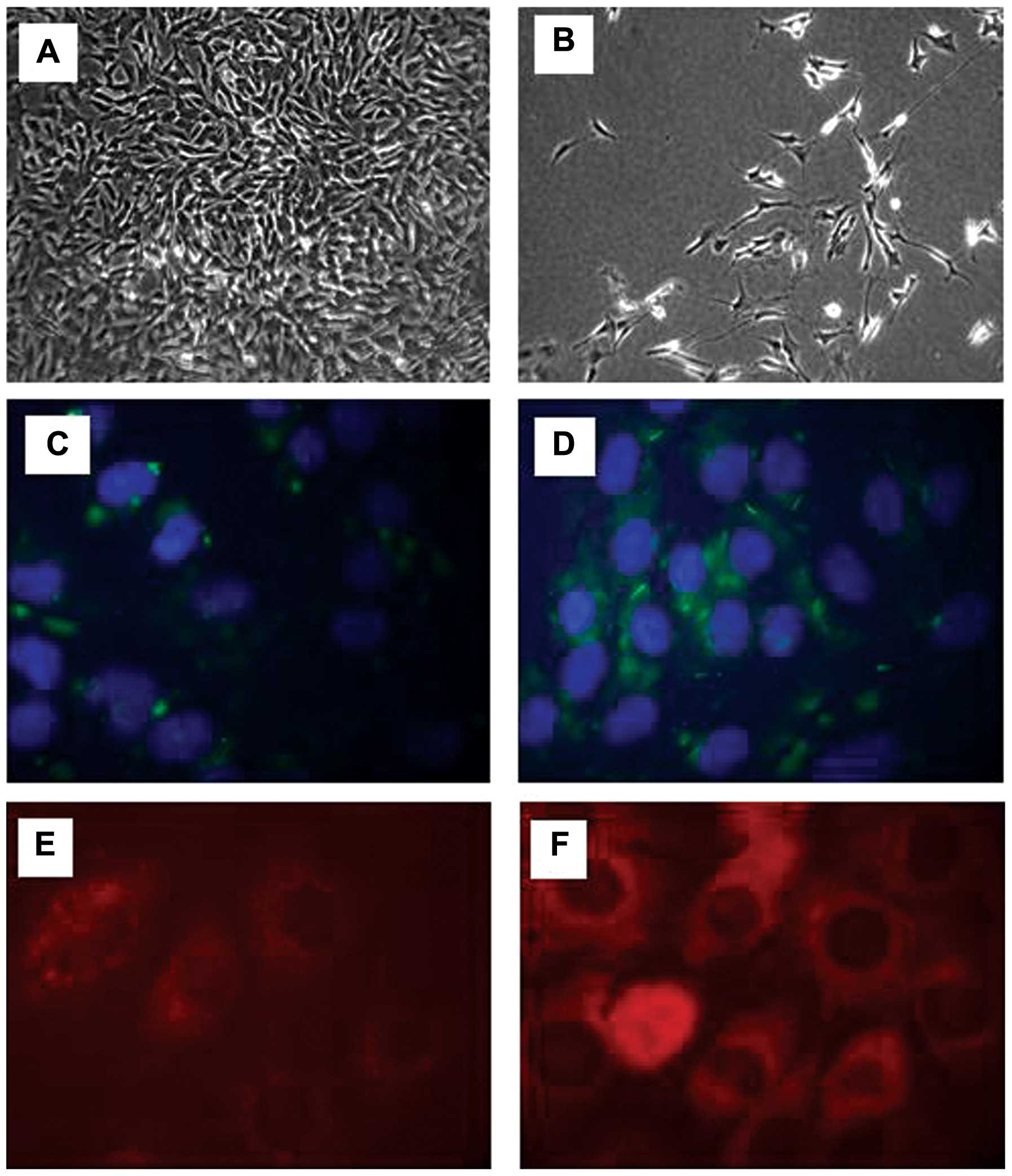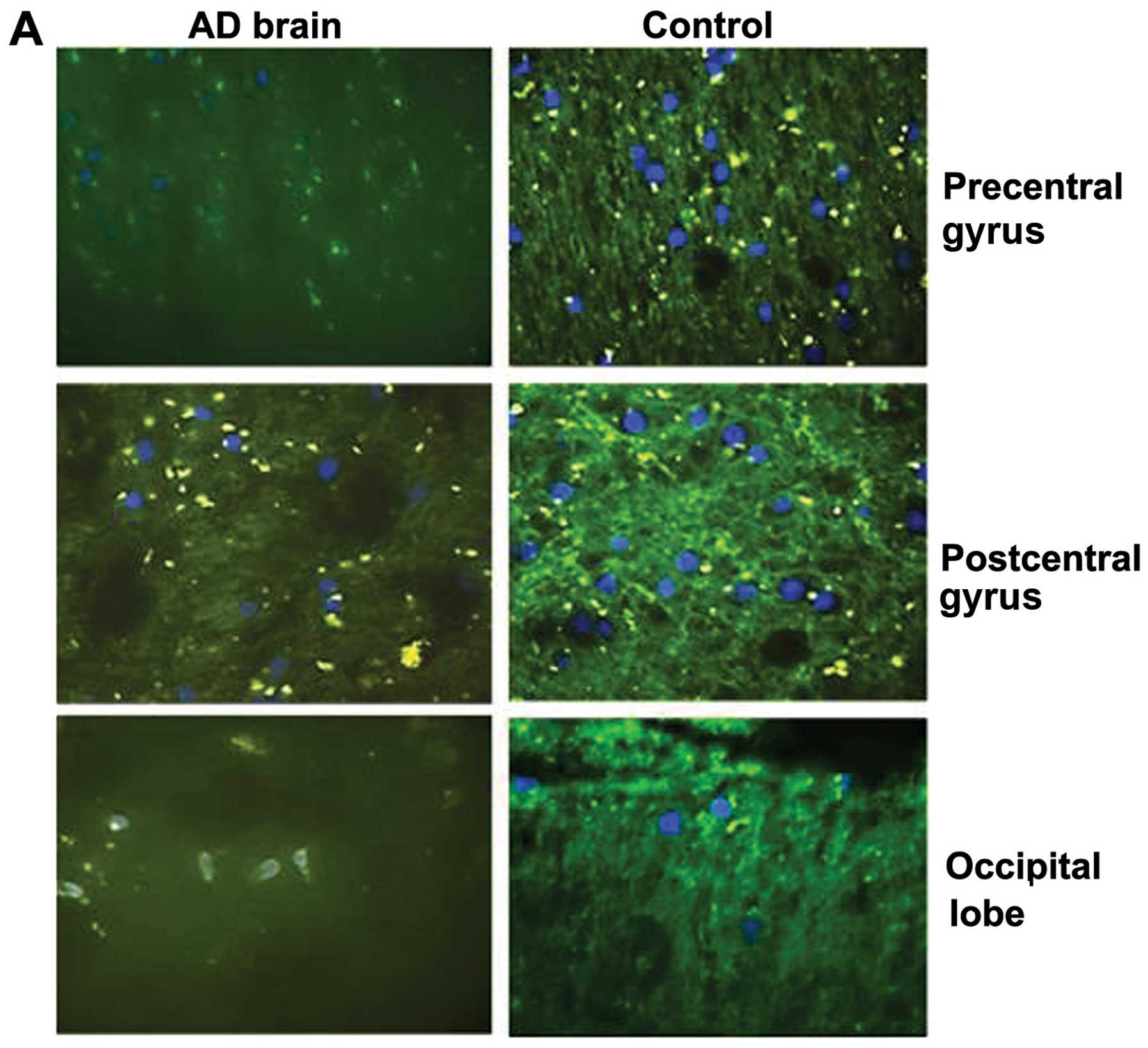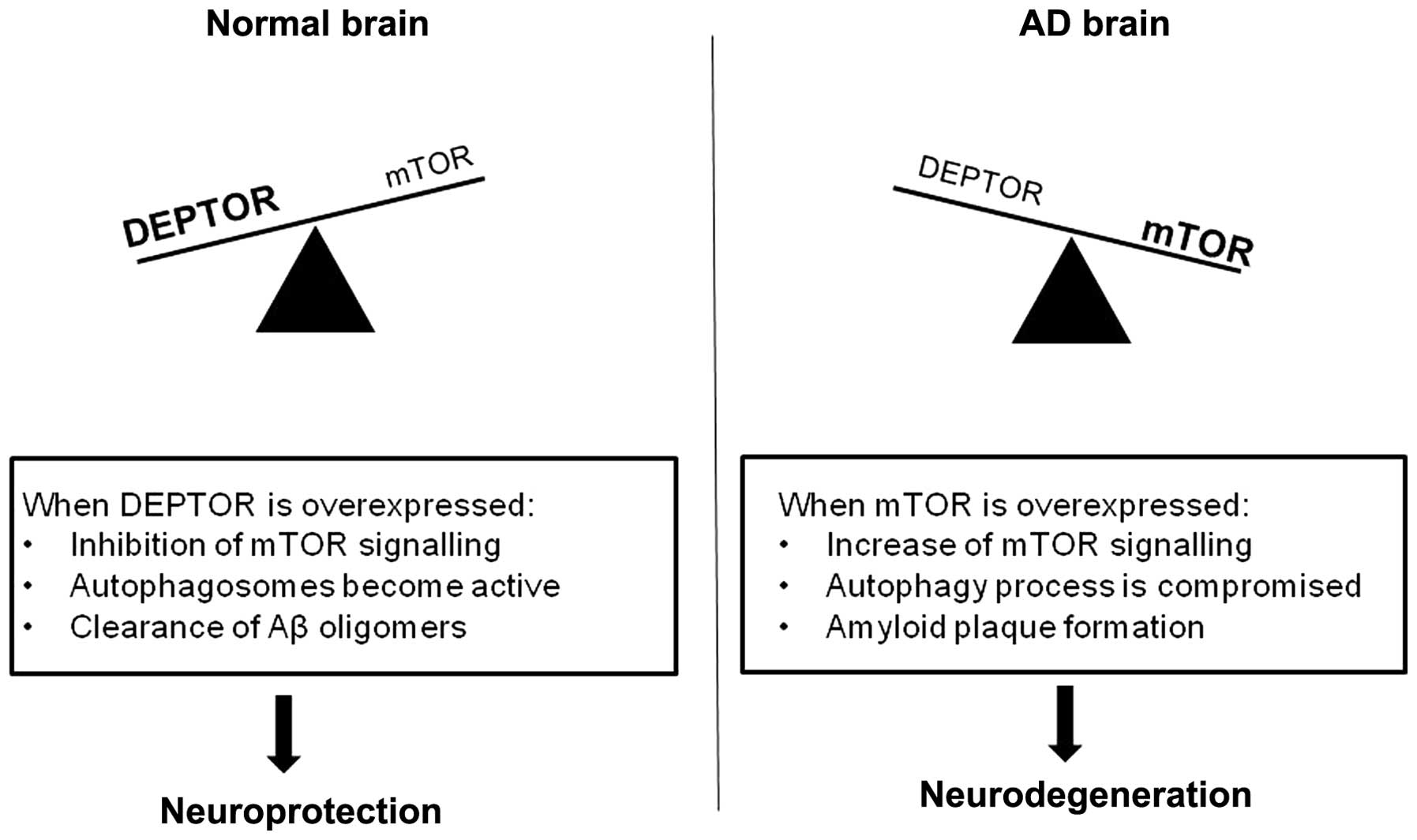|
1
|
Pei JJ and Hugon J: mTOR-dependent
signalling in Alzheimer’s disease. J Cell Mol Med. 12:2525–2532.
2008.PubMed/NCBI
|
|
2
|
Blennow K, de Leon MJ and Zetterberg H:
Alzheimer’s disease. Lancet. 368:387–403. 2006.
|
|
3
|
Brown EJ, Albers MW, Shin TB, Ichikawa K,
Keith CT, Lane WS, et al: A mammalian protein targeted by
G1-arresting rapamycin-receptor complex. Nature. 369:756–758. 1994.
View Article : Google Scholar : PubMed/NCBI
|
|
4
|
Dennis PB, Jaeschke A, Saitoh M, Fowler B,
Kozma SC and Thomas G: Mammalian TOR: a homeostatic ATP sensor.
Science. 294:1102–1105. 2001. View Article : Google Scholar : PubMed/NCBI
|
|
5
|
Wullschleger S, Loewith R and Hall MN: TOR
signaling in growth and metabolism. Cell. 124:471–484. 2006.
View Article : Google Scholar : PubMed/NCBI
|
|
6
|
Hoeffer CA and Klann E: mTOR signaling: at
the crossroads of plasticity, memory and disease. Trends Neurosci.
2:67–75. 2010. View Article : Google Scholar : PubMed/NCBI
|
|
7
|
Sutton MA and Schuman EM: Dendritic
protein synthesis, synaptic plasticity, and memory. Cell.
127:49–58. 2006. View Article : Google Scholar : PubMed/NCBI
|
|
8
|
Harrison DE, Strong R, Sharp ZD, Nelson
JF, Astle CM, Flurkey K, et al: Rapamycin fed late in life extends
lifespan in genetically heterogeneous mice. Nature. 460:392–395.
2009.PubMed/NCBI
|
|
9
|
Selman C, Tullet JM, Wieser D, Irvine E,
Lingard SJ, Choudhury AI, et al: Ribosomal protein S6 kinase 1
signaling regulates mammalian life span. Science. 326:140–144.
2009. View Article : Google Scholar : PubMed/NCBI
|
|
10
|
Boland B, Kumar A, Lee S, Platt FM, Wegiel
J, Yu WH, et al: Autophagy induction and autophagosome clearance in
neurons: relationship to autophagic pathology in Alzheimer’s
disease. J Neurosci. 28:6926–6937. 2008.PubMed/NCBI
|
|
11
|
Lafay-Chebassier C, Paccalin M, Page G,
Barc-Pain S, Perault-Pochat MC, Gil R, et al: mTOR/p70S6k
signalling alteration by Abeta exposure as well as in APP-PS1
transgenic models and in patients with Alzheimer’s disease. J
Neurochem. 94:215–225. 2005.PubMed/NCBI
|
|
12
|
Spilman P, Podlutskaya N, Hart MJ, Debnath
J, Gorostiza O, Bredesen D, et al: Inhibition of mTOR by rapamycin
abolishes cognitive deficits and reduces amyloid-beta levels in a
mouse model of Alzheimer’s disease. PLoS One.
5:e99792010.PubMed/NCBI
|
|
13
|
Ma T, Hoeffer CA, Capetillo-Zarate E, Yu
F, Wong H, Lin MT, et al: Dysregulation of the mTOR pathway
mediates impairment of synaptic plasticity in a mouse model of
Alzheimer’s disease. PLoS One. 5:e128452010.PubMed/NCBI
|
|
14
|
Peterson TR, Laplante M, Thoreen CC,
Sancak Y, Kang SA, Kuehl WM, et al: DEPTOR is an mTOR inhibitor
frequently overexpressed in multiple myeloma cells and required for
their survival. Cell. 137:873–886. 2009. View Article : Google Scholar : PubMed/NCBI
|
|
15
|
Proud CG: Dynamic balancing: DEPTOR tips
the scales. J Mol Cell Biol. 1:61–63. 2009. View Article : Google Scholar : PubMed/NCBI
|
|
16
|
Foster H, Coley HM, Goumenou A, Pados G,
Harvey A and Karteris E: Differential expression of mTOR signalling
components in drug resistance in ovarian cancer. Anticancer Res.
30:3529–3534. 2010.PubMed/NCBI
|
|
17
|
Liu M, Wilk SA, Wang A, Zhou L, Wang RH,
Ogawa W, et al: Resveratrol inhibits mTOR signaling by promoting
the interaction between mTOR and DEPTOR. J Biol Chem.
285:36387–36394. 2010. View Article : Google Scholar : PubMed/NCBI
|
|
18
|
Lopez-Miranda V, Soto-Montenegro ML, Vera
G, Herradon E, Desco M and Abalo R: Resveratrol: a neuroprotective
polyphenol in the Mediterranean diet. Rev Neurol. 54:349–356.
2012.PubMed/NCBI
|
|
19
|
Li Z, Pang L, Fang F, Zhang G, Zhang J,
Xie M, et al: Resveratrol attenuates brain damage in a rat model of
focal cerebral ischemia via up-regulation of hippocampal Bcl-2.
Brain Res. 1450:116–124. 2012. View Article : Google Scholar : PubMed/NCBI
|
|
20
|
Huang TC, Lu KT, Wo YY, Wu YJ and Yang YL:
Resveratrol protects rats from Abeta-induced neurotoxicity by the
reduction of iNOS expression and lipid peroxidation. PLoS One.
6:e291022011. View Article : Google Scholar : PubMed/NCBI
|
|
21
|
Mparmpakas D, Zachariades E, Goumenou A,
Gidron Y and Karteris E: Placental DEPTOR as a stress sensor during
pregnancy. Clin Sci (Lond). 122:349–359. 2012. View Article : Google Scholar : PubMed/NCBI
|
|
22
|
Li X, An WL, Alafuzoff I, Soininen H,
Winblad B and Pei JJ: Phosphorylated eukaryotic translation factor
4E is elevated in Alzheimer brain. Neuroreport. 15:2237–2240. 2004.
View Article : Google Scholar : PubMed/NCBI
|
|
23
|
Steinerman JR, Irizarry M, Scarmeas N,
Raju S, Brandt J, Albert M, et al: Distinct pools of beta-amyloid
in Alzheimer disease-affected brain: a clinicopathologic study.
Arch Neurol. 65:906–912. 2008. View Article : Google Scholar : PubMed/NCBI
|
|
24
|
Kuo YM, Emmerling MR, Vigo-Pelfrey C,
Kasunic TC, Kirkpatrick JB, Murdoch GH, et al: Water-soluble Abeta
(N-40, N-42) oligomers in normal and Alzheimer disease brains. J
Biol Chem. 271:4077–4081. 1996. View Article : Google Scholar : PubMed/NCBI
|
|
25
|
Wang J, Dickson DW, Trojanowski JQ and Lee
VM: The levels of soluble versus insoluble brain Abeta distinguish
Alzheimer’s disease from normal and pathologic aging. Exp Neurol.
158:328–337. 1999.
|
|
26
|
Dwane S, Durack E and Kiely PA: Optimising
parameters for the differentiation of SH-SY5Y cells to study cell
adhesion and cell migration. BMC Res Notes. 6:3662013. View Article : Google Scholar : PubMed/NCBI
|
|
27
|
Petratos S, Li QX, George AJ, Hou X, Kerr
ML, Unabia SE, et al: The beta-amyloid protein of Alzheimer’s
disease increases neuronal CRMP-2 phosphorylation by a Rho-GTP
mechanism. Brain. 131:90–108. 2008.
|
|
28
|
Bachmann RA, Kim JH, Wu AL, Park IH and
Chen J: A nuclear transport signal in mammalian target of rapamycin
is critical for its cytoplasmic signaling to S6 kinase 1. J Biol
Chem. 281:7357–7363. 2006. View Article : Google Scholar : PubMed/NCBI
|
|
29
|
Sanchez-Espinosa MP, Atienza M and Cantero
JL: Sleep deficits in mild cognitive impairment are associated with
increased plasma amyloid-beta levels and cortical thinning.
Neuroimage. 98:395–404. 2014. View Article : Google Scholar
|
|
30
|
Canu E, McLaren DG, Fitzgerald ME, Bendlin
BB, Zoccatelli G, Alessandrini F, et al: Mapping the structural
brain changes in Alzheimer’s disease: The independent contribution
of two imaging modalities. J Alzheimers Dis. 26(Suppl 3):
S263–S274. 2011.
|
|
31
|
Banno K, Nakaaki S, Sato J, Torii K,
Narumoto J, Miyata J, et al: Neural basis of three dimensions of
agitated behaviors in patients with Alzheimer disease.
Neuropsychiatr Dis Treat. 10:339–348. 2014.PubMed/NCBI
|
|
32
|
Nagahama Y, Okina T, Suzuki N and Matsuda
M: Neural correlates of psychotic symptoms in dementia with Lewy
bodies. Brain. 133:557–567. 2010. View Article : Google Scholar : PubMed/NCBI
|
|
33
|
Bagyinszky E, Youn YC, An SS and Kim S:
The genetics of Alzheimer’s disease. Clin Interv Aging. 9:535–551.
2014.
|
|
34
|
Borovecki F, Klepac N, Muck-Seler D,
Hajnsek S, Mubrin Z and Pivac N: Unraveling the biological
mechanisms in Alzheimer’s disease - lessons from genomics. Prog
Neuropsychopharmacol Biol Psychiatry. 35:340–37. 2010.
|
|
35
|
Caccamo A, Maldonado MA, Majumder S,
Medina DX, Holbein W, Magri A, et al: Naturally secreted
amyloid-beta increases mammalian target of rapamycin (mTOR)
activity via a PRAS40-mediated mechanism. J Biol Chem.
286:8924–8932. 2011. View Article : Google Scholar : PubMed/NCBI
|
|
36
|
Cai Z, Zhao B, Li K, Zhang L, Li C, Quazi
SH, et al: Mammalian target of rapamycin: a valid therapeutic
target through the autophagy pathway for Alzheimer’s disease? J
Neurosci Res. 90:1105–1118. 2012.PubMed/NCBI
|


















